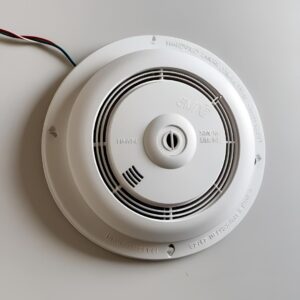In terms of safeguarding your home and loved ones, smoke detectors are an essential requirement. These essential devices for detecting fires early provide you with the vital time necessary to respond effectively, essentially avoiding the challenges of selling a fire-damaged house. When considering the debate of a hardwired smoke detector vs battery-operated models, how can you determine the best option for your home?
This blog will break down the pros and cons of both types, helping you make an informed decision that balances safety, convenience, and budget priorities.

What Are Hardwired Smoke Detectors?
Hardwired smoke detectors are connected directly to your home’s electrical system. They utilize your home’s electricity and include a backup battery to maintain operation during power failures.
Generally, these detectors are linked together. This indicates that when one alarm activates, every alarm in your house will sound at once, offering a complete home alert system. Wired smoke detectors are frequently placed in modern homes or during significant remodels.
How Hardwired Smoke Detectors Work
- Primary Power Source: Your home’s electricity
- Backup Power: Batteries (usually 9-volt or lithium) to maintain operation during outages
- Interconnectivity: Alarms are hardwired together to provide comprehensive coverage
- Professional Installation Required for proper setup and wiring
What Are Battery-Operated Smoke Detectors?
In contrast, battery-powered smoke alarms are independent units. They do not depend on your home’s electrical system and operate solely on batteries.
These detectors are easy to install, making them popular for quick, cost-effective fire protection. However, their functionality is tied to the battery’s lifespan, requiring regular maintenance to avoid the risk of dead batteries.
How Battery-Operated Smoke Detectors Work
- Power Source: Batteries (alkaline or lithium options)
- Standalone Operation: No wiring is needed; each alarm functions independently
- Ease of Set-Up: Can be installed in minutes without professional help
The Pros and Cons of Hardwired Smoke Detectors
Pros
- Continuous Power Supply
Hardwired detectors link to your home’s electrical system, guaranteeing they remain powered unless there is a main power failure.
- Whole-Home Interconnectivity
When interconnected, triggering one alarm activates every alarm in your home. This provides immediate, widespread alerts, crucial for multi-story or larger homes.
- Long-Term Reliability
With a constant power source and less dependency on battery maintenance, these systems are reliable over the long term.
Cons
- Requires Professional Installation
In contrast to battery-powered models, hardwired detectors require professional installation, increasing the initial expense.
- Vulnerability During Power Outages
Without its backup battery, a hardwired detector won’t function during power failures. A missing or dead backup battery creates a weak link.
- Higher Upfront Cost
Expenses encompass the cost of advanced units and the manpower required for installation.
The Pros and Cons of Battery-Operated Smoke Detectors
Pros
- Easy Installation
Battery-powered smoke detectors are easy to install and can be set up in a few minutes without any expert assistance.
- Lower Initial Cost
These detectors are more budget-friendly upfront, making them accessible for all households.
- No Power Dependency
Units powered by batteries will function reliably during power failures, guaranteeing ongoing safety.
Cons
- Frequent Battery Replacement Required
Batteries must be changed frequently to guarantee the alarm operates correctly. This increases the time and cost for continuous maintenance.
- No Interconnectivity
Without more advanced models, battery-operated detectors work as standalone units, which could compromise safety in multi-room or multi-story homes.
- Risk of Neglecting Dead Batteries
The device is completely inoperable if the batteries deplete and aren’t replaced, creating a serious safety hazard.
Key Factors to Consider When Choosing
When choosing between a hardwired smoke detector and a battery-powered model, various factors should be considered.
1. Home Setup
- New Construction: Hardwired systems are typically integrated during the construction or renovation phase.
- Existing Homes: Battery-operated units are more compatible with homes where wiring isn’t already in place.
2. Budget
- Upfront Cost: Hardwired systems cost more initially due to professional installation requirements.
- Maintenance Costs: Battery-operated systems might require frequent replacements, adding to their lifetime cost.
3. Convenience
- Hardwired systems require less maintenance but demand more effort during installation. Battery-operated systems are easy to install but need regular battery checks and replacements.
4. Safety Needs
- Large Homes: Interlinked hardwired systems can offer improved safety for properties with multiple stories or rooms.
- Small Homes: Battery-operated alarms might suffice for smaller residences.
5. Local Regulations
Some building codes specify the type of smoke detector required. Be sure to check your local requirements before purchasing.
Considering Hybrid Options
If you’re conflicted between hardwired and battery systems, there’s a compromise worth considering. Numerous contemporary smoke alarms operate on dual power sources.
Benefits of Dual-Powered Systems
- Continuous Power: Powered by electricity but backed up by batteries to ensure functionality during outages.
- Interconnectivity: Often connects multiple alarms for comprehensive home alerts.
- Enhanced Safety: Combines the reliability of hardwired systems with the fail-safe of battery power.
These hybrid alternatives provide advantages from both sides and may serve as a great answer, particularly for bigger houses or families with significant safety worries.
Making the Right Choice for Your Home
Deciding between a hardwired smoke detector vs battery-operated model ultimately depends on your home’s particular requirements and your individual preferences. Wired detectors ensure long-lasting reliability and connectivity, whereas battery-powered systems present flexibility, reduced expenses, and simpler installation.
Prior to deciding, evaluate your finances, home design, and desired convenience level. Additionally, make sure to review any local laws to confirm adherence.
The safety of your family is invaluable, so whatever option you choose—whether it’s a hardwired smoke detector vs battery-operated model—make sure it’s one that brings you reassurance.
Previous